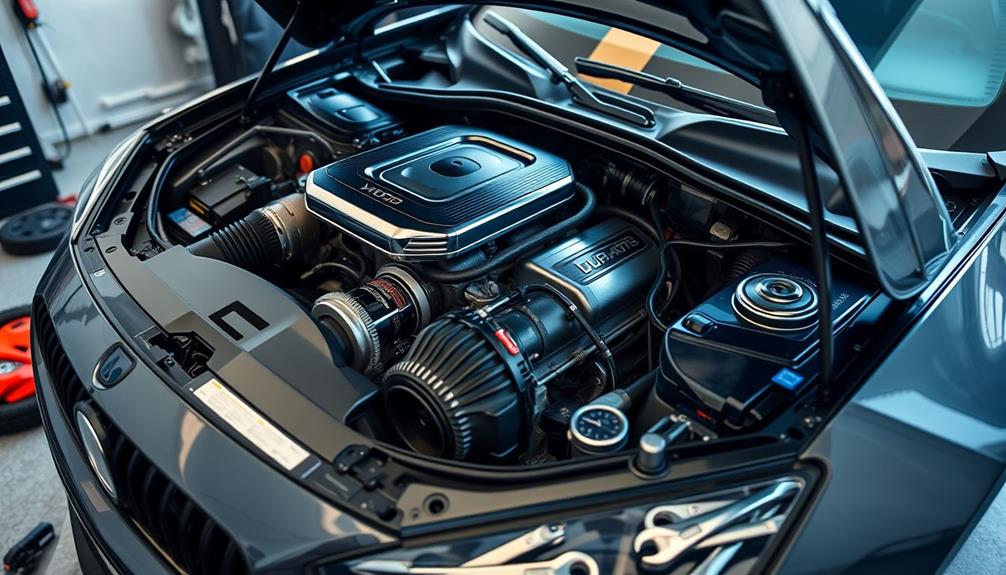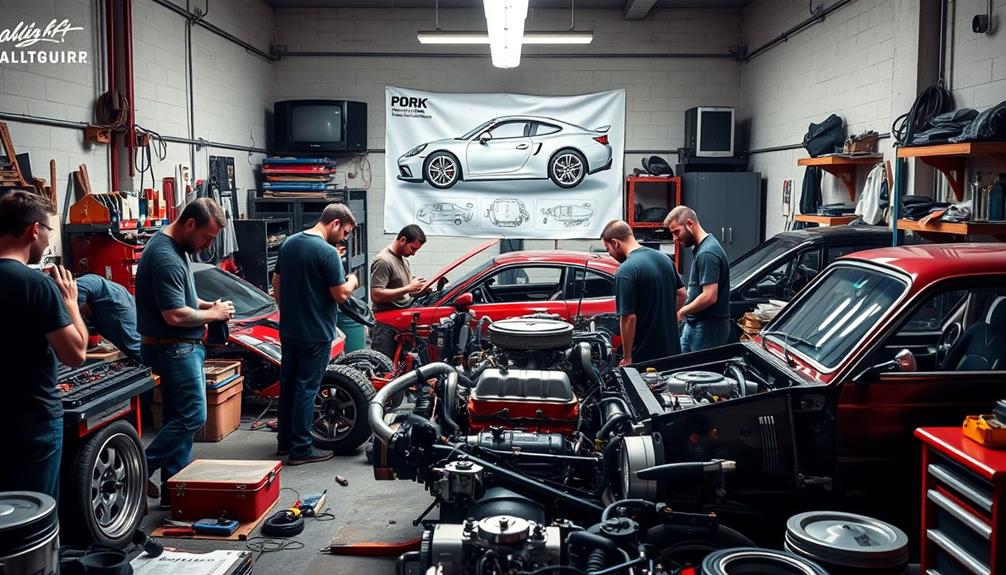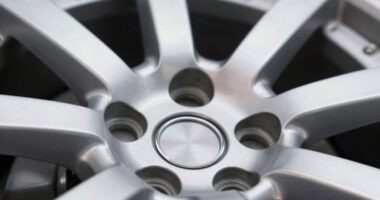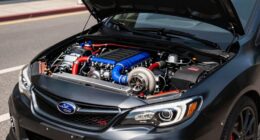To transform your ride through car tuning, start by understanding the core components. Modify your engine for extra horsepower and torque with ECU remapping, and boost handling by upgrading your suspension. Don't forget to enhance airflow with a better air intake and exhaust system. Prioritize safety by choosing larger brake pads. You can choose to tackle tuning yourself for cost savings or hire professionals for customized solutions. Just be aware of local regulations to avoid fines. There's so much more to explore, and these expert tips will guide you to release your car's full potential. When it comes to car tuning essentials, it’s important to also consider upgrading your tires for better traction and performance. Additionally, investing in a high-performance clutch can help handle the extra power from engine modifications. It’s also crucial to regularly maintain and tune your car to ensure everything is in top shape for optimal performance.
Key Takeaways
- Start with a comprehensive ECU remap to optimize fuel injection and ignition timing for improved horsepower and torque.
- Upgrade the air intake system to enhance airflow, resulting in better combustion efficiency and overall engine performance.
- Consider exhaust system modifications to reduce back pressure, facilitating better airflow and increasing power output.
- Invest in quality suspension components to improve handling, stability, and reduce body roll during aggressive driving.
- Always ensure modifications comply with local regulations to avoid fines and maintain road safety.
Understanding Car Tuning
Understanding car tuning is like revealing your vehicle's hidden potential. You're not just modifying for aesthetics; you're enhancing engine performance, fuel efficiency, and handling characteristics.
With the right car tuning approach, you can achieve specific performance goals that make your driving experience more thrilling.
One of the most common tuning methods involves ECU remaps, which optimize your engine's performance by adjusting its settings to release extra horsepower and torque. You might also consider upgrades to your air intake and tweaks to your suspension systems, as these can dramatically improve your vehicle's responsiveness and agility on the road.
However, you must guarantee that all modifications comply with local regulations. Some tuning changes may be prohibited on public roads, so understanding legal compliance is vital to avoid fines or complications.
Ultimately, car tuning is about enhancing performance while maintaining safety and legality. By carefully selecting compatible components for your vehicle's make and model, you can access a driving experience that's not only exhilarating but also efficient and smooth.
Embrace the journey of tuning, and watch your ride transform into something extraordinary!
Essential Components for Tuning

When tuning your car, focusing on the right components can make all the difference in performance. You'll want to enhance your engine tuning, which can greatly boost horsepower and torque through modifications like ECU remapping and turbocharging. This improves throttle response and optimizes fuel economy.
Upgrading suspension components is essential too. Quality shocks and springs enhance handling and stability, reducing body roll during turns. To guarantee you can stop as well as you go, consider larger brake pads and rotors for improved stopping power.
Don't overlook exhaust systems, as high-performance setups facilitate better airflow, reducing back pressure while giving your ride a more aggressive sound. Additionally, enhancing your air intake can further optimize your engine's efficiency.
Here's a quick guide to important tuning components:
| Component | Benefit | Key Impact |
|---|---|---|
| Engine Tuning | Boosts horsepower & torque | Enhanced throttle response |
| Suspension Components | Improves handling | Better road control |
| Exhaust Systems | Improves airflow | Increases engine efficiency |
| Brake Pads | Enhances stopping power | Guarantees safety during performance |
Benefits and Risks of Tuning

Tuning your car can access a world of performance enhancement, elevating your driving experience to new heights. By increasing horsepower and torque, tuning leads to quicker acceleration and improved responsiveness, transforming how you interact with the road.
You can also optimize fuel efficiency, allowing you to enjoy better mileage without sacrificing power, potentially saving money on fuel costs.
However, tuning comes with its risks. Legal compliance is critical, as certain modifications might violate regulations, resulting in fines or failing emissions tests.
Additionally, safety should always be a priority; modifications that compromise your vehicle's structural integrity or braking performance can create hazardous driving conditions.
It's essential to weigh the financial investment in tuning against the potential benefits. Improperly executed modifications can lead to costly repairs or decreased engine reliability, creating more issues than you anticipated.
Before diving into tuning, verify you're aware of both the performance gains and potential issues that may arise. Balancing these factors will help you make informed decisions and enjoy a thrilling yet safe driving experience.
DIY Vs. Professional Approaches

Choosing between DIY and professional tuning can greatly impact your car's performance and your overall experience. While DIY tuning might seem cost-effective, it carries risks that could lead to costly mistakes. Professional tuners bring expertise and specialized tools, guaranteeing modifications are done safely and effectively.
Here's a quick comparison to evaluate:
| Aspect | DIY Approach | Professional Tuning |
|---|---|---|
| Cost Efficiency | Saves on labor costs | Higher upfront investment |
| Expertise Requirement | Requires solid automotive knowledge | Specialized knowledge and tools |
| Customization Potential | Standard modifications | Tailored options for performance |
| Legal Compliance | Risk of overlooking regulations | Guarantees compliance with laws |
Engaging in DIY tuning offers valuable hands-on experience and a deeper understanding of vehicle mechanics. However, it can be time-consuming and frustrating without prior expertise. On the other hand, professional tuning not only enhances performance but also guarantees legal compliance, saving you from potential fines. Ultimately, weigh your skills, budget, and desired outcomes to determine which approach aligns best with your tuning goals.
Advanced Tuning Techniques

As you explore advanced tuning techniques, you'll discover a range of methods designed to elevate your car's performance considerably. One of the most impactful modifications is ECU remapping. By adjusting the engine control unit's software, you can enhance fuel injection, ignition timing, and boost pressure, resulting in significant horsepower gains and improved fuel efficiency.
Exhaust upgrades are another essential tool for car enthusiasts. By reducing back pressure, these upgrades enhance exhaust flow, allowing your engine to breathe better and produce a more aggressive sound, all while boosting performance.
Coupling exhaust upgrades with cold air intake systems can yield remarkable results. These systems increase the volume of cooler, denser air entering the engine, further enhancing combustion efficiency and potentially increasing horsepower by 5-20%.
Don't overlook suspension modifications either. Adaptive suspension systems utilize sensors to adjust damping rates automatically, giving you ideal ride comfort and handling across various terrains.
Finally, consider aerodynamic enhancements like spoilers and diffusers, which improve high-speed stability and reduce drag, leading to better handling and acceleration.
With these advanced tuning techniques, you're well on your way to transforming your ride.
Frequently Asked Questions
What Are the Steps to Tuning a Car?
To tune your car, assess its performance, check engine health, choose tuning methods based on your goals, use dyno testing for accuracy, and maintain detailed records of modifications for tracking improvements and compliance.
How Much HP Does Tuning Your Car Give?
Tuning your car's like releasing a beast! You can boost horsepower by 10% to 30% with various modifications. Expect gains of 25 to 50 hp for turbo engines, while naturally aspirated ones add 10 to 20 hp.
How to Modify Your Car to Make It Faster?
To make your car faster, upgrade your engine components, enhance suspension for better handling, install a high-performance exhaust system, and use lightweight materials. Regularly monitor and tune your settings for peak performance and responsiveness.
Can You Tune a Car Yourself?
Absolutely, you can tune your car yourself! With the right tools and knowledge, you'll enhance performance and responsiveness. Just start small, learn the basics, and guarantee your modifications meet local regulations for safety and legality.
Conclusion
As you immerse yourself in car tuning, you might just find yourself bonding with fellow enthusiasts at the local garage on a Saturday morning. The smell of fresh oil and the sound of revving engines create an atmosphere that sparks creativity and passion. Whether you're fine-tuning your ride's performance or simply enhancing its appearance, remember that every adjustment brings you closer to your dream car. Embrace the journey, and enjoy the thrill of transforming your ride into something truly unique.









